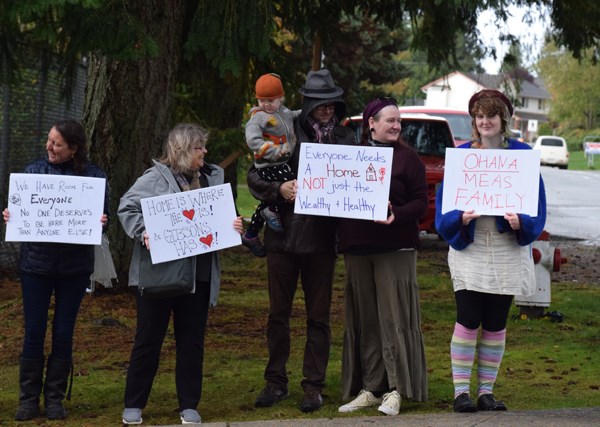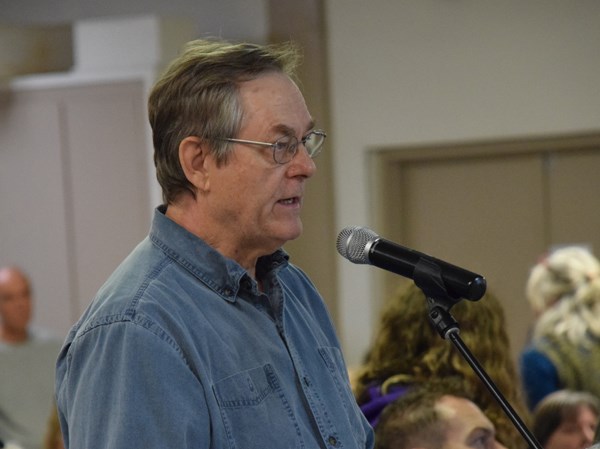After four-and-a-half hours of presentations from more than 60 speakers, councillors in Gibsons are now facing a difficult balancing act as they try to make a decision on a controversial supportive housing project proposed for 749 School Rd.
About 200 people came out to the Oct. 17 public hearing on BC Housing’s application for zoning and Official Community Plan (OCP) amendments to build a 40-unit modular building at the site of the old RCMP station.
A slim majority of the more than 60 people who spoke at the hearing were opposed, but almost all of them made a point of saying they were in favour of supportive housing, just not at that location.
Objections revolved around the potential impact on a residential neighbourhood with an elementary school nearby.
As well as the speakers, there were more than 200 written submissions – 158 in support of the project and 39 opposed.
Council was also presented with a petition with more than 400 signatures asking that the property “be used for subsidized housing for single parents with children” and the supportive housing project “be placed on a more appropriate, larger property in an area away from schools.”
The people behind the petition were immediate neighbours of the School Road property, including Linda Atkins.
“Children must be allowed to live their lives without exposure to the drug trade and our seniors must be allowed to live out their golden years free from the fear of violence and crime associated with the drug trade,” she said.
Another neighbourhood resident, Brad Zalys, a retired RCMP officer and former commander of the Sunshine Coast detachment, drew a connection between the substance use that some of the residents of the project may be involved in and crime.
“For those with addictions, they must be able to satisfy those addictions and most will have difficulty doing so on their limited incomes. How do they supplement those incomes? More often it is through property crime… It is, of course, uncertain what the impact of such a facility in Gibsons would have on a neighbourhood until it’s operating, but there will be some impact,” Zalys said.
Others spoke about feeling railroaded by the process, which they said didn’t include enough public consultation early on, especially before the Town and federal government entered into their agreement.
“We’ve been told lies of omission from the very get-go from the Town, BC Housing and RainCity,” said Ian McGinnis.
William Baker of Gibsons likened the process to trying to cram a large foot into a small glass slipper.
There were also several calls to seek alternative locations, including from former mayor Barry Janyk.
“Given the apparent strident opposition to this proposal – a proposal being proffered by the province, who has no responsibility or obligations here – maybe, just maybe, there’s another avenue that could be explored,” Janyk said, suggesting a site north of the new RCMP station on Sunnycrest Road as a possibility.
Other opponents spoke of lost property values, including the owners of a School Road home who said they’ve pulled it from the market after getting no offers despite a $90,000 price reduction.
“I am appalled at the anguish my parents are now being forced to suffer,” their daughter said. “They have spent a lifetime working hard and contributing to society to be able to afford a very modest home to retire to in a neighbourhood where they felt safe and secure. They now find themselves afraid of their own neighbourhood, suffering from stress and anxiety, unable to sleep at night.”
People in favour, including former Gibsons councillor Lee Ann Johnson, spoke mainly of the need for the facility and the obligation of the community to care for its most vulnerable.
“Most of [the homeless] are very local people, most of them are over 50 years old, so when we speak about the need to protect seniors this project will be protecting the most vulnerable of our seniors,” she said.

School trustee and Gibsons resident Amanda Amaral said as a social worker and school board member she supports the project “without hesitation.”
Rodney Rissanen, a resident of the Hightide supportive housing building in Sechelt who is hoping to transfer to the new facility in Gibsons, also spoke.
“I want people to see what candidates [for supportive housing] look like,” he said. “I’m not an addict. I’m not an alcoholic. I don’t have mental health issues,” Rissanen said. “I’m disabled. At $906 a month let’s see you try to find rental accommodations… I’m from Gibsons. I want to move back to my home. Let me move back to my home – please.”
Devon Kennedy of the Sunshine Coast Community Services Society read a letter from the organization that told the story of David, a pseudonym for a client who is also now a Hightide resident.
“David now feels safe. He is now participating in more programs, including a job readiness program and has started down the long road of freeing himself from drug use… Safe, affordable and dignified housing changes lives,” she said.
The only resident of the immediate neighbourhood to speak in favour was Susan Milliken, who said other neighbours would likely shun her for wanting supportive housing next door.
“But I cannot be silent after watching the campaign levelled here,” she said. “Defacing signs, notices on my doorstep vilifying people with health issues, distorting of information to get people to sign petitions. I heard the sales pitch for the petition that there’d be no supervision at the School Road location and that homeless people have been blanketing the neighbourhood with broken glass and needles. Surprisingly, people are falling for this. This level of bullying has had its results, but I’m not so easily fooled.”
Mayor Bill Beamish adjourned the hearing by telling the audience, which had dwindled to around 30 by 10:30 p.m., that council expected to receive a report on the hearing and vote on whether to move the bylaw amendments forward in early November.



